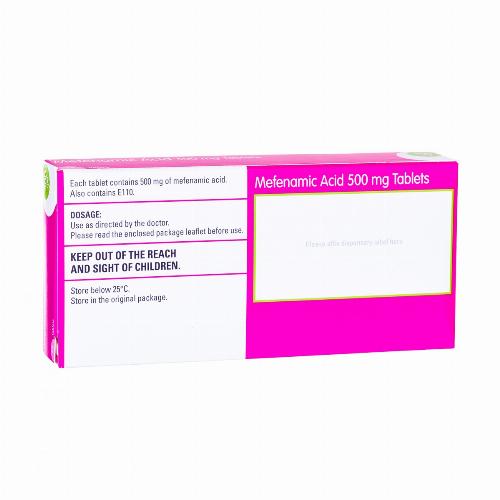Mefenamic Acid
Mefenamic acid is one of the group of drugs called non-steroidal, anti-inflammatories. Mefenamic acid is used to relieve a variety of different kinds of discomfort or pain but primarily, it is used for the relief of period pain. It may also be prescribed to women after childbirth.
-
${ slotProps.product.price }$
Product not found, please try a different combination

All inclusive service
No hidden fees

Free Tracked Delivery
Delivered in plain packaging

Prescription included
Via our online consultation
Product Description
How does Mefenamic Acid work?
Mefenamic acid has an active ingredient which targets inflammation or pain in your body to relieve it.
What are the benefits of taking it?
Periods differ from woman to woman but for some, they can be a tremendously uncomfortable and painful experience that last for a protracted amount of time.
Taking Mefenamic acid to relieve pain and inflammation allows women to carry on with their daily lives, whatever phase of their menstrual cycle they’re in.
How do I use Mefenamic acid?
Mefenamic acid is a prescription-only medicine. Always follow the advice of your GP or healthcare practitioner and read the patient information leaflet provided in the medication packet.
With a drink of water, swallow the tablet whole, do not chew or crush them. It’s recommended that you take these tablets during or just after a meal, with the dose decided upon by your doctor, based on the type and severity of the condition that is being treated.
Dosage:
Mefenamic acid has an active, anti-inflammatory ingredient and the capsules or tablets come in a variety of doses. The usual dose for many adults is 500mg, 3 times a day (1500mg in total). However GP’s often prescribe a lower amount for those aged over 70.
If you take more Mefenamic acid than you should, you may experience side effects. Contact your doctor immediately. If you forget to take the medication, take it as soon as you remember, if it is not too close to the time of your next dose. Never double up on your dose to make up for a forgotten one.
Side effects of Mefenamic Acid:
The most common side effects of using Mefenamic acid include:
- Diarrhoea or constipation, wind
- Feeling sick (nausea), vomiting, loss of appetite
- Sore mouth and/or lips
- Stomach ache, indigestion, abdominal pain/discomfort
- Blood in the stools or urine
- Oily stools
- Inflammation of the pancreas, stomach, small intestine or colon
If you do experience one or more of these side effects and they persist or worsen, tell your GP straight away. You should also contact your GP immediately if you experience any serious side effects, such as a severe skin reaction, vomiting blood, or difficulty breathing.
Precautions when taking Mefenamic Acid:
Before taking this medication, you should always consult your doctor first. You should not take Mefenamic acid if any of the following apply:
- You have a history of stomach bleeding or perforation (which may be related to the use of aspirin or NSAIDs; naproxen, ibuprofen, diclofenac) or a history of allergy to those.
- Are allergic to Mefenamic acid or any of the ingredients contained in it.
- You have a history of or active disorders of the stomach or intestines
- Ulcerative colitis
- Crohn’s disease
- Gastrointestinal cancers
- Diverticulitis
- Severe heart failure
- Severe liver or kidney failure
- Are in the last three months of a pregnancy
- Recently had coronary artery bypass graft surgery
- Are taking aspirin or any other non-steroidal anti-inflammatory drugs for pain relief such as, naproxen or diclofenac
- Take anticoagulants like warfarin to prevent blood clots.
Your prescription may also be affected by a number of other factors, so you should make your GP aware if any of the following apply to you:
- Are an older person
- Asthma or a history of asthma
- Ulcerative colitis or Crohn’s disease
- Systemic lupus erythematosus (SLE)
- Are known to be a poor metaboliser of CYP2C9
- Kidney disease and dehydration
- Liver disease
- Diabetes
- Heart problems or a previous stroke or think you might be at risk of these
- Take a painkiller for headaches regularly over a prolonged period
- Have a bleeding disorder
- You are going to have major surgery
- Epilepsy
- Take other NSAIDs (e.g. ibuprofen, diclofenac)
- Take other anti-inflammatory medicines including steroids
- Take aspirin or medicines that thin the blood
- Take antidepressants known as selective serotonin re-uptake inhibitors (SSRI)
- Have a problem with the metabolism of sugar in your body
Mefenamic acid, like many other medications, can affect or be affected by other medicines. Specific drugs that you may experience this with can include:
- Low dose aspirin (75mg)
- Corticosteroids
- Certain medicines used to treat heart conditions such as cardiac glycosides
- Probenecid used in the treatment of gout
- Some medicines for depression such as lithium
- Methotrexate
- Cyclosporin
- Antihypertensives and ACE inhibitors, used to treat high blood pressure
- Quinolone antibiotics
- Diuretics such as hydrochlorothiazide
- Anti-platelet agents (used to prevent blood clots)
- Tacrolimus which is used to suppress the immune system
- Zidovudine which is used in the treatment of AIDS and HIV infection
- Aminoglycoside antibiotics
- Mifepristone
- Some diabetic medicines such as (e.g. glipizide, glibenclamide).
If you are taking any of the above medicines, you should make your doctor or healthcare practitioner aware so that they can advise whether or not Mefenamic acid will be the best way forward for you.
If you are pregnant then you should consult with your GP before taking Mefenamic acid. It is absolutely not suitable for those in the last 3 months of pregnancy, but effects on the baby in the first 6 months are unknown. This means it’s not typically recommended but your GP may prescribe it to you if they feel it necessary. Mefenamic acid will also make it more difficult for you to get pregnant.
If you are breastfeeding, be aware that Mefenamic acid can be passed into your breast milk and therefore should not be taken during this period, unless expressly instructed to do so by your GP.
Where can I buy Mefenamic Acid?
Mefenamic Acid is a prescription only medication meaning that you cannot buy the medication over the counter from supermarkets or pharmacies. However, if you do not want to go to the hassle of arranging an appointment and visiting your doctor for a face to face consultation, you can arrange an online consultation with MedsRUs to get a prescription for Mefenamic Acid with the click of a button.
During this quick and easy process, you will simply need to fill in a medical questionnaire answering a few short questions and our certified prescribers will be able to ascertain whether this medication is suitable for you and your condition. Once the questions have been asked and the doctors have confirmed it is the right treatment, you will be provided with a prescription and the medication will be dispensed immediately and sent directly to you.
This whole process can be done in minutes, without even having to leave your house. To get started, click the ‘start consultation’ button at the top of this page.





